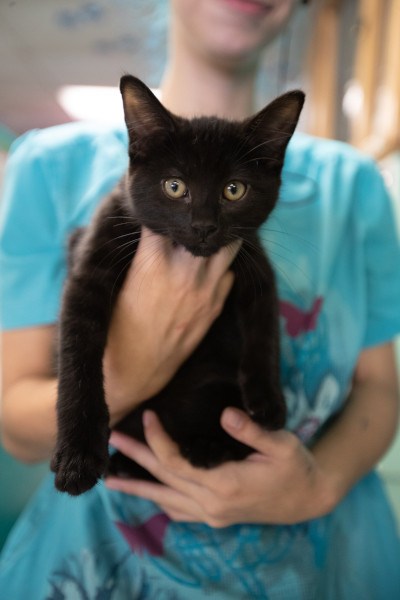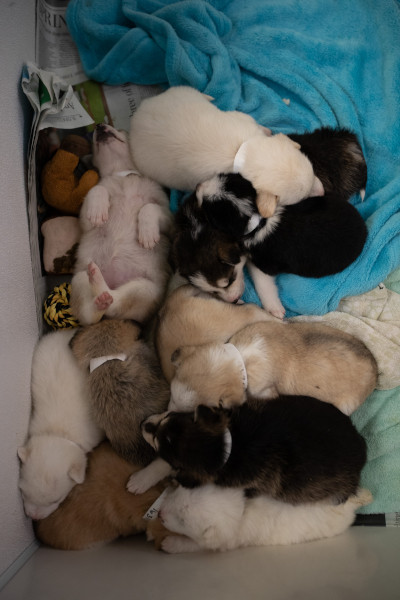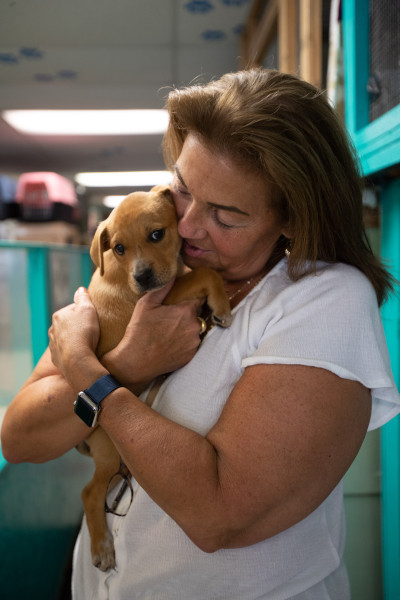Curing loneliness at a cost
Furry friends in a time of isolation
Becca Anderson, adoption counsellor at Winnipeg Pet Rescue, holds a rescue named Dragon.
Carla Martinelli-Irvine, the founder and executive director of Winnipeg Pet Rescue, says the pandemic played an important role in the adoption of animals in a very positive way, especially during its first wave.
“That’s where we saw most adoptions take place,” she says. Martinelli-Irvine says Winnipeg Pet Rescue cautioned people that they “would eventually be going back to work at some point” and shouldn’t adopt pets impulsively.
“Adopting an animal shouldn’t just have to do with wanting a companion during the pandemic. It should have to do with the (potentially) 16-year commitment.”
Many pet guardians, however, have since returned to the office. That transition, coupled with inflation, has impacted their ability to care for these new pets. It has become increasingly difficult for people with pets to remain financially stable while purchasing necessary pet items and comfortably leaving their animal companions at home for several hours on end.
Pet costs may include veterinary bills, grooming expenses, food, treats and training classes. Lenore Hume, director of marketing and communications at the Winnipeg Humane Society (WHS), says the organization’s surrender list has been steadily growing, even prior to the pandemic. A surrender list tracks animals whose owners are waiting to relinquish their pet to a shelter.
“It’s been very challenging, because we only have so much capacity here at the shelter ... there (are) always animals coming in ... (but) we had to triage and prioritize surrenders,” Hume says. “We have a surrender waitlist, which currently has just under 300 animals. Whereas a few years ago, our surrender list might (have hovered) around 100 to 150 animals.”
Common reasons for surrendering a pet can range from financial or housing struggles to behavioural problems with that animal. Hume says some owners’ reasons for surrendering a pet are associated with longer-lasting effects of the pandemic.
Specifically, many dogs and puppies have been surrendered because of behavioural problems, which are likely due to their lack of socialization with other people and animals.
“It could be that someone got a puppy during the pandemic and hasn’t had the resources or availability to do the training (the same way) they would if we hadn’t had a pandemic (and returned to work in person),” Hume says.
On the other side of the city at Winnipeg Pet Rescue, the shelter experienced much more adopting out than relinquishing of pets. Martinelli-Irvine says she believes one of the main reasons that the pandemic called for many pet adoptions is due to the loneliness many people experienced.
Companionship
“There was a lot of loneliness during the pandemic, especially for people who were living at home by themselves and no longer working in person. They didn’t have that socialization that we humans tend to crave,” Martinelli-Irvine says. “Animals can mend that loneliness. They depend on you to get up in the morning ... to feed them, to let them outside. They’re a commitment.”
Pets may have also helped people experiencing loss during the pandemic, whether of a loved one, a job or an overall sense of safety and security. Martinelli-Irvine describes pets as “God’s creations that are there to help us emotionally” and clarifies that pets aren’t simply “just cats and dogs.”
“They’re beings with sentience and presence,” she says. “Just having that presence in your home can help end loneliness altogether.”
Martinelli-Irvine emphasizes that having an animal around throughout the pandemic seemed trendy. With family members returning to work in-person work and many houses becoming empty during the day, some may have opted to bring home a furry friend to aid the loneliness.
Pride, guilt and shame
Both Hume and Martinelli-Irvine believe pet owners don’t always admit to the real reasons they relinquish animals, likely to protect their sense of pride. Reasons related to job loss, financial instability and inability to care for an animal may leave people feeling embarrassed or uncomfortable.
To combat these feelings, Hume and Martinelli-Irvine say pet guardians may instead place blame on the animals themselves, citing behaviour problems instead of the truth. They may also feel guilty or shameful about seeing relinquishing an animal as their only solution.
Some of the 18 puppies that came in to the Winnipeg Pet Rescue shelter in one night after being found abandoned at the dump in Shamattawa First Nation, Man.
Martinelli-Irvine says Winnipeg Pet Rescue has seen pet owners provide misleading information when relinquishing animals. However, she also mentions the humiliation people may feel when unable to financially support their pet any longer.
“There is a sense of shame when people don’t have the financial means. That’s one of the main reasons why we may have seen a small uptick in relinquishing (during) the pandemic,” Martinelli-Irvine says.
“We do have people that have relinquished because they can’t afford vet bills anymore, but it’s really nobody’s business what financial situation anyone else is in ... We simply reassure them that we’re going to take care of their animal. We handle things with kindness and grace.”
According to Hume, the WHS also strives to be a judgment-free zone when it comes to relinquishing animals. She says their job is not to accuse anyone of doing something wrong, but to simply help pets and their owners. “If someone is looking to surrender their animal, no one is being judged as a bad pet owner. We just want to offer as many programs as we can that will offer assistance to this need,” Hume says.
Martinelli-Irvine also reminds pet parents that it’s okay to leave animals at home for short periods of time.
“It’s the quality of time that you spend with your pet when you’re at home. If you’re going to school or work, and they’re being left for eight hours alone, don’t feel guilty. We have to work. Not all of us have the privilege of bringing our pets to work with us,” Martinelli-Irvine says. “When you get home, your animal will love you. It’s better than being in a shelter where everything is strange to them.”
Serving the community and the animals
Carla Martinelli-Irvine, founder and executive director of Winnipeg Pet Rescue, holds a 10-weekold puppy named Tai.
“We work with the community members who can’t afford regular vet care, for example, to help them get the animal through those medical needs ... (We do) anything to ensure that the animal can stay in their home, which is the best place for a pet,” Hume says.
Some of the programs the WHS offers include behaviour classes, a behavioural help and training program, an emergency food bank, their safepet program, the home-to-home program and options for emergency boarding.
“We really encourage people to utilize the home-to-home program. It’s an online tool that pet owners can use if they need to rehome their animal,” Hume says. “(This allows) pets to find a loving new home without entering the shelter.”
Some pet owners, regardless of the programs and assistance offered, may still feel that relinquishing their animal is the best option for them. Martinelli-Irvine cautions those who may pass judgment on pet owners who have had to make this decision. She reminds individuals that no one truly knows the events happening in others’ lives.
“I think it’s very important for people to be aware that they won’t be made to feel bad should they need to relinquish their beloved pet,” Martinelli-Irvine says. “I’d much prefer animals be brought into our shelter, where people don’t have to worry about feeling ashamed or guilty about doing it. We’re here to serve the community and the animals.”
Published in Volume 77, Number 05 of The Uniter (October 6, 2022)







